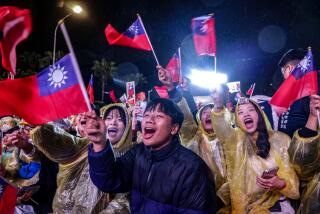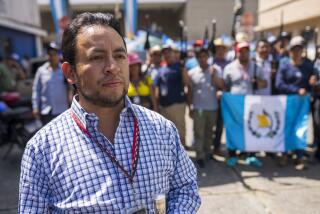Proud Spirit of Independence Hums in Ruins of East Timor
- Share via
LALEIA, East Timor — In this sun-drenched village perched on a rocky hillside, the inhabitants have democracy, hope and little else.
On Thursday, they will leave their temporary huts made of palm fronds and corrugated metal and vote in East Timor’s first free election. For now, that will have to be enough.
“The election is like a hope for the people because we have attained what we were fighting for,” said Miguel Gusmao, 53, as he trimmed palms with a machete to make the wall of a new hut.
Like many villages across East Timor, Laleia was destroyed two years ago when anti-independence militias punished the territory for voting to break away from Indonesia.
The villagers fled to the mountains and lived there for two months. The pro-Indonesian militias burned every home in Laleia to the ground.
The residents may have lost everything they owned, but they are proud that the family of rebel leader Jose Alexandre Gusmao hails from this village. The resistance hero is almost certain to become East Timor’s first president next year when the territory becomes fully independent.
Several villagers share the Gusmao name. Miguel Gusmao says he is a cousin of the resistance leader, who is popularly known as Xanana. Some of the older villagers say they remember the rebel chief visiting and playing here as a child.
Today all that’s left of his ancestral home is a concrete slab covered with weeds and broken glass.
Thursday’s election will take place on the second anniversary of the independence vote. This time, voters will select a constituent assembly that will write East Timor’s constitution--the “mother law,” as it is often called.
“Even though people are living in these huts and living in poverty, having the constitution is very important,” said Miguel Gusmao’s 26-year-old son, Jose. “If we don’t have a democratic system, how can our country be safe and stable?”
Jose Alexandre Gusmao announced Saturday that he will bow to political pressure and become a candidate when a presidential election is held next year. He is so popular that he already had the support of many of the 16 political parties vying for seats in the 88-member assembly.
Fretilin, or the Revolutionary Front for an Independent East Timor, is likely to emerge from the elections as the largest party in parliament.
While some leaders have called for prosecution of those who destroyed East Timor in 1999, the rebel leader took a more conciliatory approach Tuesday in talking with reporters.
He noted that East Timor has been devastated three times in recent history, first by the Japanese occupation during World War II, then by Indonesia’s invasion in 1975, and most recently by the Indonesian-sponsored militias. It is time, he suggested, to end the cycle of violence.
“In my personal opinion, we have to combine reconciliation with justice and amnesty,” he said in English, one of at least four languages he speaks. “If they burned our house, why don’t we ask them to build the house instead of putting them in prison? There are many ways of justice.”
Gusmao began fighting Indonesia in 1975 when its troops occupied East Timor as colonial power Portugal prepared to pull out. He assumed command of the resistance after its other leaders were killed. He was arrested in 1992 and imprisoned in Jakarta, the Indonesian capital, until the province voted for independence and he was freed.
The soft-spoken leader met with reporters in the backyard of his modest home in Dili, the capital of East Timor. He was interrupted now and then by the sounds of dogs barking, roosters crowing and neighborhood children playing.
For the last two years, East Timor has been administered by the United Nations and protected by thousands of international peacekeeping troops. Gusmao acknowledged that the territory will have to rely on foreign help for years as it attempts to rebuild.
“We are aware the next five years will depend, I must say, absolutely on international aid,” he said. “Maybe after that we can get some income from our resources.”
Gusmao said he had agreed only reluctantly to run for president because political parties were already declaring him their candidate.
“I am conscious that I am not the best person for the job,” he said Saturday in announcing his candidacy. “It is true that I have begun to feel tired as a consequence of 25 years of heavy responsibility. I always nurtured the dream that after independence I would have time to cultivate pumpkins and breed animals.”
Asked Tuesday if he was afraid of taking on the presidency, he replied, “It is not in my personality.”
More to Read
Sign up for Essential California
The most important California stories and recommendations in your inbox every morning.
You may occasionally receive promotional content from the Los Angeles Times.










